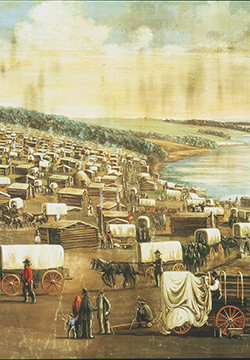After Joseph and Hyrum Smith surrendered to the authorities in the morning, Illinois Governor Thomas Ford paraded the brothers through the ranks of the troops assembled by his orders from the surrounding counties. The Smiths and the other defendants were arraigned before Justice of the Peace Robert F. Smith, also Captain of the Carthage Greys. The case was postponed until October because Francis Higbee, a key witness, failed to appear. All the defendants posted bail, even in excessive amounts. Joseph and Hyrum were served writs charging them with treason, a nonbailable offense.
